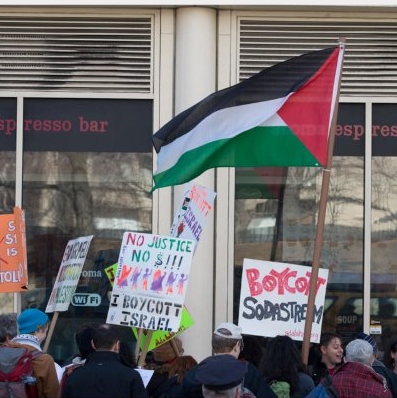click to dowload our latest edition
CLICK HERE TO SUBSCRIBE TO OUR NEWSLETTER


Published
7 years agoon
By
adminPAULA SLIER
The IAW may have been in the news in South Africa over the past few days, but other than three small articles, each in a different Israeli publication, there was hardly a murmur in this part of the world.
That’s not to say people in Israel are unconcerned. Since last year the government has upped its fight against BDS with Prime Minister Benjamin Netanyahu confronting the movement head-on in his speeches, appointing Home Security, Strategic Affairs and Public Diplomacy Minister Gilad Erdan to fight it and even going so far as to allocate almost 100 million Israeli shekels ($25 million) towards a special anti-BDS task force.
But not everyone agrees this is money well spent. Critics insist BDS must be fought abroad – on campuses and European capitals, not through the Israeli Ministry of Strategic Affairs.
Even more critics charge that the louder the pro-Israel message is on campus, the more likely it is to backfire. Universities tend to be places that support the perceived underdog and for a state that was conceived in Europe and which stands as a bulwark of the American empire, there’s simply no way to make Israel popular.
On paper, at least, BDS is dangerous because it brings together a lot of, especially young, motivated activists united in their attempts to delegitimise Israel.
But the other side of the coin is also true. Former Prime Minister Golda Meir once famously remarked to US President Richard Nixon: “You may be the president of 250 million, but I’m the prime minister of five million prime ministers.”
It’s rare in Israel to find people in agreement – except perhaps when the country is at war (and even then not always) – but when it comes to BDS, just about everyone is on the same page – it isn’t good for Israel and many argue it isn’t good for those it purports to help – Palestinians.
Left-wing Israelis and advocacy groups like J Street argue IAW makes no distinction between West Bank settlements and Israel proper; that it places the entirety of blame for the Israeli/Palestinian conflict unfairly on Israel; and through comparisons with apartheid implies the illegitimacy of the state.
What’s more, such an approach doesn’t offer solutions. You can’t make peace with someone you want to boycott. “What’s the point of BDS?” I’m asked again and again by Israelis when I bring up the topic. “Just to tell the world how terrible we are?”
It’s a view echoed by Palestinians I ask as well. Polls show that support among Palestinians for BDS is on the decline. What saw more than 170 Palestinian civil society organisations rally behind the BDS call for non-violent resistance 12 years ago, hasn’t, they repeatedly tell me, brought the conflict any closer to a resolution. The senior Palestinian leadership is also not a fan.
Palestinian President Mahmoud Abbas is on record as saying: “No, we do not support the boycott of Israel.” For Abbas, too, a distinction needs to be made between boycotting Israel and boycotting products made in the settlements – the latter of which he’s a strong advocate.
“The settlements are in our territories. They’re illegal,” he’s said time and time again. “But we do not ask anyone to boycott Israel itself. We have relations with Israel; we have mutual recognition of Israel.”
But even the boycott of settlements is controversial. I once sat down with a Palestinian father of nine. He was helping to erect Israel’s security fence and only agreed to the interview on condition I hide his face and conceal his identity.
Without this job, he told me, he’d be unable to put food on the table for his children. An estimated 40 000 Palestinians work in the settlements, many in construction, earning up to three times as much as the average Palestinian wage.
Not that this justifies the settlement enterprise of course and there’s a valid argument that it’s the Israeli occupation that has undermined the ability of Palestinians to develop their own economy and improve a 27 per cent unemployment rate. Few Palestinians happily work in the settlements – they do it out of necessity.
This time last year, thanks to BDS, hundreds of Palestinians were laid off after the SodaStream factory where they worked, moved out of the West Bank and back into Israel. BDS hurt the very people it purported to help.
Dore Gold, president of the Jerusalem Centre for Public Affairs and a former Israeli ambassador to the United Nations, has criticised IAW for not only not respecting human rights, but being “an incredibly hypocritical initiative that ignores the apartheid practised by the Palestinians themselves, who make the sale of land to Jews punishable by death.
It is also not a movement dedicated to making peace, but rather to denying the historical rights of the Jewish people.”
BDS advocates insist they’re making headway and no doubt the analogy between Israel and apartheid is a strong one that will continue to be used effectively in future. But don’t expect it to make headlines here in Israel anytime soon.
Paula Slier is the Middle East Bureau Chief of RT, the founder and CEO of NewshoundMedia and the inaugural winner of the Europcar Woman in Leadership award of the South African Absa Jewish Achievers.

nat cheiman
Mar 9, 2017 at 12:56 pm
‘If being excluded/banned and/or boycotted is BDS interpretation of making headway, then that, in itself is a reason to believe that they are vapid.
No one, except BDS’ ers believe their propaganda anymore.
Its tired and worn out.’